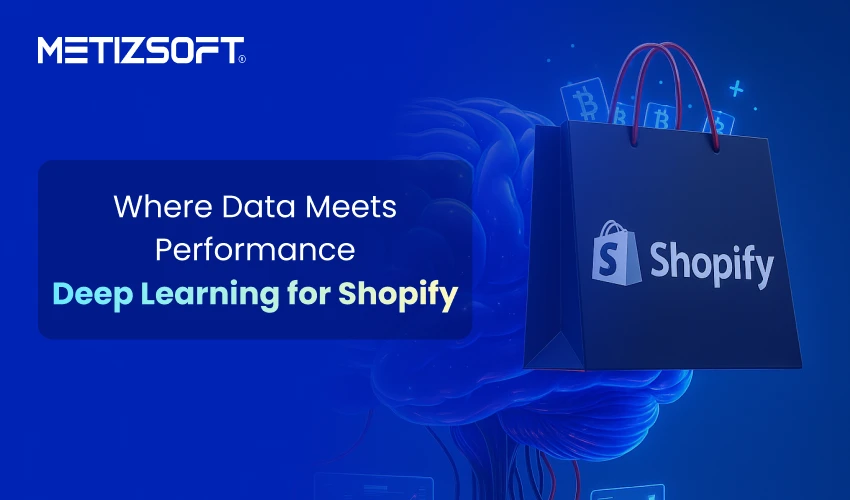
Deep learning models improve Shopify store performance by leveraging smart technologies such as predictive analytics, dynamic pricing, personalized product recommendations, automated content, and enhanced customer support. These models analyze large volumes of customer and sales data to help your store make real-time decisions that boost sales, increase average order value (AOV), and manage stock more efficiently.
Table of Contents
Introduction
In 2025, Shopify stores compete globally, where every millisecond counts. Research shows that nearly 47% of users want a site to load in less than 2 seconds. And why not? Stores with faster load times achieve 70% higher conversion rates. Moreover, a delay of just 1 second can reduce conversions by 7-20%. To stay competitive, Shopify store performance must be continuously optimized, leveraging powerful tools and techniques, including deep learning models that efficiently transform e-commerce capabilities.
What is a Deep Learning Model for Shopify?
A deep learning model is your smart AI assistant built into your Shopify store. It learns from customers’ behavior, what they search for, view, and buy and helps personalize their shopping journey. It dynamically manages pricing, automates content updates, predicts stock needs, and assists with faster, safer transactions. This all happens behind the scenes, making your store smarter and faster without extra manual work.
Why does this matter?
Integrating deep learning transforms a Shopify store from static to adaptive.
Customers receive relevant product suggestions instantly, prices adjust to trends, inventory is optimized to avoid shortages, and content engages shoppers better.
This method increases sales, improves customer loyalty, and leads to efficient operations. These important factors contribute to sustained growth in the online business.
Deep Learning Ways to Optimize Your Shopify Store Performance
- Personalized Product Recommendation: AI learns customers’ preferences from their browsing history, past purchases, and demographics. This helps it offer product recommendations that feel perfectly suited to each individual shopper.
- Automated Content Creation and SEO: Machine learning enables the automated generation of attractive product descriptions, ad copy, and SEO-optimized elements. The best thing here is that it saves you time, and at the same time, your marketing messages stay consistent and are backed by data.
- Dynamic Pricing Optimization: Deep learning models help stores change their prices based on what competitors are charging and the market situation. This approach can increase earnings while still being competitive.
- SEO and Marketing Optimization: AI makes it easier to find the right keywords, improve content, and target ads. This leads to more visitors from search engines and improved results from advertising campaigns.
- Fraud Detection and Security: Models detect suspicious transactions in real time, prevent fraud, build trust, and secure shopping experiences.
- Predictive Analytics and Demand Forecasting: Deep learning models help predict what customers want to buy and how sales will change. This allows stores to handle their inventory better, making sure they have enough items on hand without overstocking. Overall, this leads to a more efficient supply chain and distribution process.
- AI-Powered Customer Support: Chatbots and virtual assistants driven by deep learning provide round-the-clock automated customer service for handling routine inquiries, order tracking, and returns, enhancing customer satisfaction.
These combined AI-driven improvements help Shopify stores increase revenue, streamline operations, and improve customer retention. Consequently, it helps Shopify store owners stay competitive in the evolving e-commerce landscape.
Overcoming Common Deep Learning Model Optimization Issues
- Data Quality Challenges
- What is it? Not every time will you get to work with a clean, structured dataset. So, poor or incomplete data in your system can make models struggle to perform.
- Damage it causes: Such data results in inaccurate decisions, which can hurt customer experience and profits.
- Solution: You must conduct regular data cleaning and validate data inputs.
2. Integration Complexity
- What is it? Difficulties connecting learning models with the Shopify backend.
- Damage it causes: Delays in system updates or problems with them can interrupt how the store updates.
- Solution: Hire AI experts or partner with a Shopify development agency to ensure a smooth setup.
3. Overfitting and Inflexibility
- What is it? Models that learned strictly from older information struggle to adjust to new trends.
- Damage it causes: This can result in poorer performance and lost chances.
- Solution: You or the experts you hired need to retrain models with fresh, updated data continuously.
4. User Trust and Transparency
- What is it? Unclear AI decision-making reduces stakeholder confidence.
- Damage it causes: Resistance to adoption or under-utilization of tools.
- Solution: It requires you to provide clear reporting and human oversight in workflows.
Deep Learning Shopify Optimization Weekly Action Plan
Week 1: Quick Wins to Boost Speed
- Conduct a complete checkup of your website using tools such as Google PageSpeed Insights and Shopify’s Performance Dashboard.
- Make all page and product images smaller by using tools like TinyPNG or TinyIMG to reduce file sizes without losing quality.
- Find and uninstall any Shopify apps you are not using or do not need, as they can slow down your store.
- Harness the lazy loading technique for images and videos so they load only when visible on the screen.
Week 2: Core Store Improvements
- Evaluate your current Shopify theme and switch to a lightweight, mobile-responsive theme optimized for speed if needed.
- Shorten CSS and JavaScript files to reduce their size and the number of requests your store makes.
- Broken links and redirects are to be checked; to ensure promptness and better ranking for your site, either fix or remove them.
- To optimize web fonts, limit both the number and types of fonts, and wherever possible, use system fonts.
Week 3: Mobile Optimization and Advanced Improvements
- Carry out complete mobile usability testing and speed optimization to give a flawless experience on all devices.
- Use Accelerated Mobile Pages (AMP) or any other related technology to make mobile loading superfast.
- Set up Google Tag Manager to reduce page load and manage scripts smartly.
- Incorporate AI-powered applications, such as predictive navigation or smart search, to enhance the buyer experience.
- Conduct a final management audit and measure the differences from the previous weeks.
Ongoing Monthly Maintenance
- Conduct monthly speed and performance audits using Google Lighthouse, GTmetrix, or Pingdom.
- Regularly optimize new product images and content added to your store.
- Review and manage installed apps periodically to maintain lean, fast-loading pages.
- Stay updated on Shopify development best practices and emerging optimization tools.
Start Your Deep Learning Model Shopify Optimization Journey Today
Metizsoft is home to seasoned AI developers and certified Shopify experts who collaborate with your store. Our professionals are skilled at seamless integration, leveraging reliable technology to enhance your Shopify store’s functionality. We provide real-world knowledge and continuous optimization to help you expand. We will offer you a deep learning optimization service aligning our strengths, which includes:
- Experienced Team: A dedicated team of consultants and experts who go from understanding concepts to strategy making and result-driven store optimization process using the latest tools, technologies, and methods.
- Regular Monitoring: Our job doesn’t end with one-time solutions. We keep tracking the performance of your store and perform timely updates and changes to maintain its reliability.
- Continuous Support: Irrespective of your time zone, we assure you end-to-end professional, technical, and non-technical assistance. You can discuss your queries and get instant updates with timely solutions.
We are a leading and easy-to-approach Shopify AI solutions provider in the US and India. We feature the best team with high-end proficiency with advanced tools and techniques. You can trust us to get a performance boost for your Shopify store’s deep learning model optimization.
Future Trends for Deep Learning Models for eCommerce
- Integration with Shopify’s evolving APIs and plug-ins for smoother deployment.
- Advanced real-time personalization engines using behavioral analytics.
- The rise of edge computing is to speed up content delivery to the closest consumers.
- More intelligent, flexible fraud detection systems are already identifying new danger patterns.
- Voice and visual searches are being automatically improved through SEO practices.
- The combination of data insights and marketing automation in a hybrid platform.
Final Remarks
Optimizing your Shopify store with deep learning models unlocks faster site speed, smarter business decisions, and a better shopping experience. Adopting these advanced strategies will give your store the competitive advantage it needs in 2025 and beyond, whether you work alone or collaborate with a specialized Shopify development company like Metizsoft.
Do you think you’re ready to improve your store’s performance? Contact Metizsoft’s expert team today and take your e-commerce success to the next level.
FAQ
Can my specific theme or product benefit from deep learning model optimization?
Absolutely, these models can adapt to the specific information and product types in your store, so they work well across any field or industry.
Can deep learning optimizations improve the mobile experience of my Shopify store?
Absolutely. These models analyze mobile user behavior to optimize content, speed, and navigation, resulting in a faster, more intuitive shopping experience across all devices.
How quickly can I get results after implementing deep learning optimizations in my Shopify store?
Many stores see improvements in speed and conversion in just a few weeks, but continuous data training and fine-tuning ensure continued growth and performance gains over time.
Will deleting apps slow down the performance of my store?
Getting rid of apps you don’t use actually helps free up resources and often makes your store faster. Just be sure to test things out after you uninstall an app.
Does Shopify hosting affect store speed?
Shopify’s built-in hosting is typically quite fast, but to really maximize its speed, you might need to fine-tune your theme, apps, and other assets.
AboutManthan Bhavsar
Related Posts
Leveraging AI for Financial Forecasting To Overcome Data and Regulatory Hurdles
Table of Contents IntroductionUnderstanding Financial ForecastingThe Role of AI in Financial ForecastingTackling Financial...
How Can Shopify PDP Schema Blueprint Boost Your Store’s AI Visibility and Search Ranking?
Table of Contents SummaryIntroductionWhat is Shopify PDP Schema?Why is Schema Important for Shopify SEO?How to Boost Shopify...

